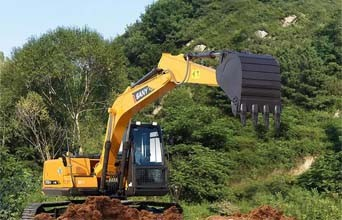Fancheng Machinery Parts.
Contact Us: +86 13026592153
Fancheng Machinery Parts.
Send your inquiry: dale3402@163.com
Contact Us: +86 13026592153
Send your inquiry: dale3402@163.com


Matching the bucket teeth on your excavator, loader or backhoe to the job cuts wear and tear on the teeth and the bucket. And it lets your equipment work to its highest potential.
Many times, a new bucket will include teeth that are ill-suited for your particular job. To make the right teeth choice, consider the type of material you intended to move and the work your equipment will perform.

The length and shape of bucket teeth affect their performance. Shapes include wider teeth that taper to a blunt point and narrower teeth with sharper points. Each shape changes the tooth consumption ratio, or the percentage of dirt, rock, or other material that comes in contact with the whole tooth. A wide bucket tooth places more surface area against the material and works for general loading and excavating applications. A tooth with a larger wear surface usually lasts longer.
More surface area does not lead to the ability to penetrate compacted, frozen or rocky materials, however. Trenching and digging require tapered bucket teeth that have sharp, pointed ends. As the sharp tooth breaks through the material, pushing the bucket through the material requires less hydraulic pressure and fuel consumption.
Flare-shaped general duty bucket teeth withstand moderate impact and abrasive conditions while leaving a smooth floor needed for trenching. Jobs that involve high impact and pry-out work with rock require short bucket teeth.
The harder the tooth material, the greater the resistance against wear, abrasion and impact, and the longer the wear life.
Special casting and heating techniques combined with certain material types such as cast austempered ductile iron (ADI) produce teeth that are stronger yet light. Backhoes, excavators and loaders use ADI teeth for moderate impact to high impact jobs.
Abrasion teeth made from ductile iron withstand highly abrasive conditions caused by working with sand, gravel, and rock. While the broader tip provides extra penetration through packed materials, the additional wear surface and ductile iron combine to extend teeth life.
Backhoes, excavators and motor graders also can use fabricated standard-duty teeth. The chrome-nickel-moly alloy steel self-sharpening teeth provide an economical solution for general applications.
Depending on the application, loaders, scrapers, excavators and backhoes can also use forged high-strength, hardened bucket teeth. Designed to resist abrasion and impact, forged teeth made from carbon, chromium, nickel and molybdenum steel offer more durability and higher tensile strength than standard-duty ductile iron teeth.